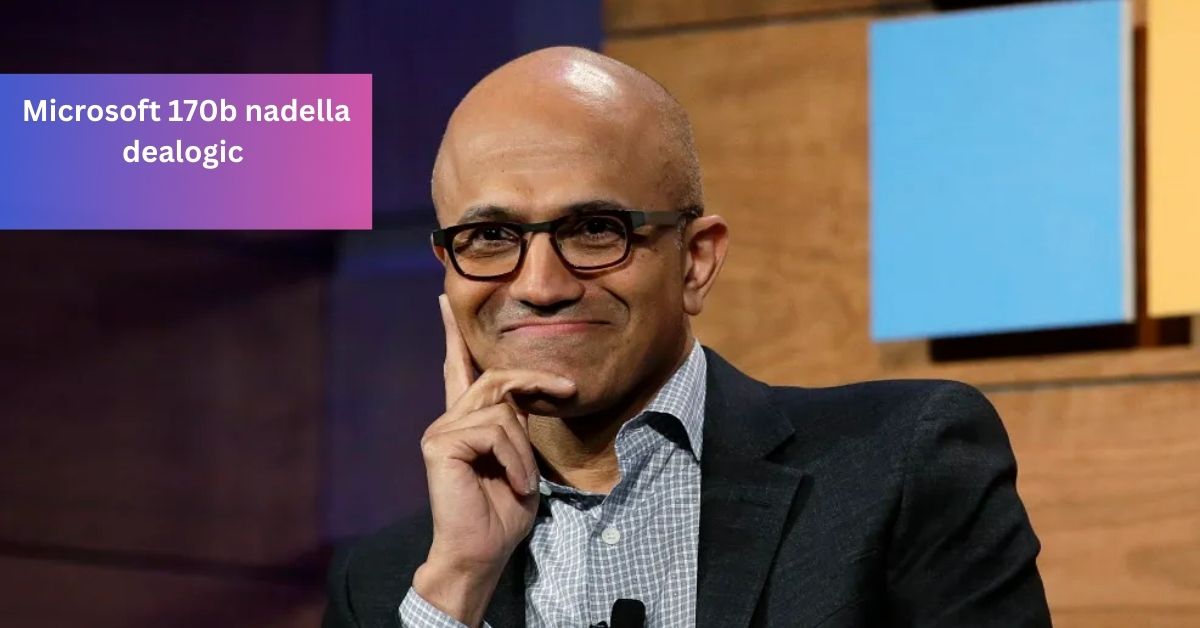Microsoft 170b nadella dealogic – Engage with Our Poll!
Introduction
In the rapidly changing tech landscape, strategic mergers and acquisitions play a crucial role in defining the future of companies. One of the most notable recent events is the Microsoft 170B deal, a landmark transaction that highlights the ambitions of Microsoft under the leadership of CEO Satya Nadella.
This deal not only marks a significant financial investment but also underscores Microsoft’s commitment to enhancing its technological capabilities and expanding its market reach. In this article, we will explore the details of the Microsoft 170B deal, its implications for the tech industry, and the future it envisions.
Understanding the Microsoft 170B Deal
What is the Microsoft 170B Deal?
The Microsoft 170B deal refers to a significant financial investment made by Microsoft in Dealogic, a financial software and data company. This acquisition aims to strengthen Microsoft’s portfolio in financial services, providing advanced analytics and data solutions to enhance decision-making in corporate finance and investment banking.
Why Dealogic?
Dealogic is known for its powerful analytics and data management tools that cater to investment banks, corporate finance professionals, and institutional investors. By acquiring Dealogic, Microsoft aims to leverage its robust technology to enhance its cloud services and provide valuable insights to financial institutions.
This strategic move is part of Microsoft’s broader initiative to integrate artificial intelligence and data analytics into its offerings.
The Vision of Satya Nadella
Leadership Style and Strategic Direction
Satya Nadella, who has been at the helm of Microsoft since 2014, has transformed the company’s vision from a traditional software vendor to a leading player in cloud computing and AI. His leadership style emphasizes collaboration, innovation, and a strong focus on customer needs.
Nadella’s strategic direction has led Microsoft to explore new avenues for growth, making significant investments in emerging technologies and industries.
The Role of Innovation
Innovation has been a cornerstone of Microsoft’s strategy under Nadella. The acquisition of Dealogic aligns with this focus on innovation, as it enables Microsoft to offer cutting-edge financial solutions powered by AI and machine learning.
This move positions Microsoft as a key player in the financial technology sector, allowing it to compete with other tech giants like Salesforce and Oracle.
Implications for the Tech Industry
Reshaping Financial Services
The Microsoft 170B deal is poised to reshape the financial services landscape. By integrating Dealogic’s technology with its Azure cloud platform, Microsoft can provide financial institutions with enhanced tools for data analysis, risk management, and client engagement.
This integration will lead to more efficient operations and better decision-making processes within investment firms and banks.
Competition in the Tech Sector
As Microsoft expands its reach into financial services, it intensifies competition among tech giants. Companies like Google, Amazon, and IBM are also vying for a stake in the lucrative financial technology market. This competitive landscape will likely drive innovation and improve service offerings for customers, benefiting the industry as a whole.
The Rise of Cloud-Based Financial Solutions
With the increasing demand for cloud-based solutions in finance, Microsoft’s acquisition of Dealogic positions it to capitalize on this trend. Financial institutions are rapidly adopting cloud technologies to enhance flexibility, scalability, and cost-efficiency.
By integrating Dealogic’s offerings with its cloud services, Microsoft can provide a comprehensive suite of financial solutions that meet the evolving needs of the market.
Detailed Insights into the Acquisition
Financial Aspects of the Deal
The Microsoft 170B deal represents one of the largest acquisitions in the tech industry. The financial details, including the valuation and structure of the deal, reflect Microsoft’s commitment to investing in technology that drives future growth.
Understanding these financial aspects is crucial for stakeholders, as they highlight the strategic importance of this acquisition.
Synergies and Integration
One of the key benefits of the Microsoft 170B deal is the potential synergies that can be realized through the integration of Dealogic’s technology with Microsoft’s existing products. This integration can lead to improved product offerings, enhanced customer experiences, and increased operational efficiency.
Moreover, it positions Microsoft to better serve its financial sector clients, driving revenue growth in the long term.
Challenges and Considerations
Regulatory Scrutiny
As with any significant acquisition, regulatory scrutiny is a critical consideration. The Microsoft 170B deal may attract attention from regulatory bodies concerned about market competition and data privacy. Microsoft will need to navigate these regulatory landscapes carefully to ensure compliance while pursuing its strategic goals.
Cultural Integration
Another challenge in such acquisitions is cultural integration. Combining two distinct organizational cultures can be complex. Microsoft must ensure that the integration of Dealogic’s workforce aligns with its values and objectives, fostering a collaborative environment that drives innovation and success.
Future Outlook
The Next Steps for Microsoft
Following the acquisition, Microsoft will likely focus on integrating Dealogic’s technology into its existing product suite. This will involve investing in R&D to enhance the capabilities of financial solutions and improve user experiences.
Additionally, Microsoft will aim to expand its market presence within the financial sector by forging partnerships with key industry players.
Potential Impact on Customers
For customers, the Microsoft 170B deal means access to advanced financial tools and analytics that can enhance their operational efficiency and decision-making processes. Financial institutions can expect improved services and solutions tailored to their specific needs, ultimately leading to better client outcomes.
Conclusion:
The Microsoft 170B deal under Satya Nadella’s leadership marks a pivotal moment in the company’s evolution and the broader tech industry. By acquiring Dealogic, Microsoft is not only investing in advanced technology but also positioning itself as a leader in the financial services sector.
This strategic move has far-reaching implications, reshaping how financial institutions operate and compete in an increasingly digital world. As Microsoft continues to innovate and adapt to market demands, the future looks promising for both the company and its clients.
FAQs:
1. What is the Microsoft 170B deal?
The Microsoft 170B deal refers to Microsoft’s acquisition of Dealogic, a financial software and data company, aimed at enhancing Microsoft’s capabilities in the financial services sector.
2. Why did Microsoft acquire Dealogic?
Microsoft acquired Dealogic to strengthen its portfolio in financial services and leverage advanced analytics and data management tools to improve decision-making for financial institutions.
3. What are the implications of this deal for the tech industry?
The deal is set to reshape the financial services landscape, increase competition among tech giants, and drive innovation in cloud-based financial solutions.
4. How does this deal align with Satya Nadella’s vision for Microsoft?
Under Nadella’s leadership, Microsoft has focused on innovation and collaboration, and the acquisition of Dealogic reflects the company’s commitment to expanding its technology offerings in key growth sectors.
5. What are the potential challenges Microsoft may face after the acquisition?
Microsoft may face regulatory scrutiny, cultural integration challenges, and the need to effectively integrate Dealogic’s technology into its existing product suite.
6. How will customers benefit from this acquisition?
Customers will gain access to advanced financial tools and analytics, leading to improved operational efficiency and enhanced decision-making processes within financial institutions.
7. What role does cloud technology play in this deal?
Cloud technology is central to the deal, as Microsoft aims to integrate Dealogic’s offerings with its Azure platform, providing scalable and efficient solutions for financial services.
8. What are the next steps for Microsoft following the acquisition?
Microsoft will focus on integrating Dealogic’s technology, investing in R&D, and expanding its market presence in the financial sector.
9. How does this acquisition affect Microsoft’s competitors?
The deal intensifies competition in the financial technology space, prompting other tech giants to innovate and enhance their service offerings.
10. What is the long-term vision for Microsoft after this deal?
The long-term vision includes becoming a leader in the financial services sector, driving growth through innovation, and providing customers with cutting-edge solutions that meet their evolving needs.





